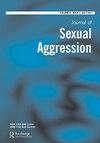Ensuring long-term success of personalised support for a young man with intellectual disability and harmful sexual behaviour: a Swiss case study
IF 1.5
4区 社会学
Q2 CRIMINOLOGY & PENOLOGY
引用次数: 0
Abstract
ABSTRACT Some people with intellectual disability who have sexually offended require long-term support with risk management. This paper demonstrates how least restrictive practices within a Swiss social care setting are utilised to support a young man with intellectual disability, mental health difficulties and persistent high risks. It is underpinned by the social model of disability, which directs attention away from individual pathology onto environmental support structures. Data was generated through qualitative interviews with the patient, forensic psychologist and social care provider and an in-depth analysis of the patient file. Current approaches to community support are synthesised and applied to this exemplary case. Hence, the analysis compares empirically based patterns from the case with the aims of risk management, person-centred planning and sexual offending treatment, highlighting the mechanisms that enable this support package to work. This results in a novel conceptualisation of sexual offending treatment success that encompasses environmental support structures. PRACTICE IMPACT STATEMENT The sociological focus of this paper emphasises the importance of learning amongst services on best means to provide collaborative, personalised support after sexual offending treatment. Achieving treatment success is no longer seen as a personal responsibility that lies with the person who has offended, and suggestions are made on means for managing individuals within social care settings. This makes vital reading for those involved in the de-institutionalisation of people with intellectual disability and persistent high risks.确保为有智力残疾和有害性行为的年轻人提供个性化支持的长期成功:瑞士案例研究
摘要一些性侵犯的智障人士需要长期的风险管理支持。本文展示了如何利用瑞士社会护理环境中限制最少的做法来支持一名患有智力残疾、心理健康困难和持续高风险的年轻人。它以残疾的社会模式为基础,将注意力从个人病理转移到环境支持结构上。数据是通过对患者、法医心理学家和社会护理提供者的定性访谈以及对患者档案的深入分析产生的。当前的社区支持方法被综合并应用于这个示例性案例。因此,该分析将案例中基于经验的模式与风险管理、以人为本的规划和性犯罪治疗的目标进行了比较,强调了使这一支持方案发挥作用的机制。这导致了性侵犯治疗成功的新概念,包括环境支持结构。实践影响声明本文的社会学重点强调了在性侵犯治疗后,在服务机构之间学习提供合作、个性化支持的最佳方法的重要性。获得治疗成功不再被视为冒犯者的个人责任,并就在社会护理环境中管理个人的方法提出了建议。这对于那些参与智力残疾和持续高风险人群去机构化的人来说是至关重要的。
本文章由计算机程序翻译,如有差异,请以英文原文为准。
求助全文
约1分钟内获得全文
求助全文

 求助内容:
求助内容: 应助结果提醒方式:
应助结果提醒方式:


